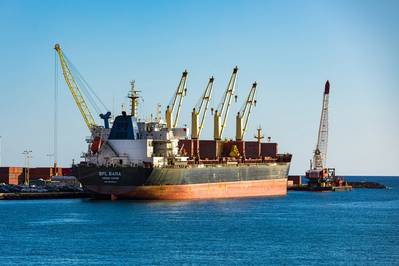Baltic Dry Index Extends Dip
The Baltic Exchange's main sea freight index fell for a fourth straight session on Tuesday as weakness in Chinese steel consumption took a toll on capesize demand, while rates for other vessel segments also retreated.
The overall index, which factors in rates for capesize, panamax and supramax shipping vessels, fell 65 points, or about 6%, to 1,017 points, a more than two-year low.
The capesize index fell for the fourth consecutive session, shedding 74 points, or about 18%, to 337 points, its lowest since early June 2020.
A sharp retraction in the overall trend brought about by the "deteriorating conditions faced in the steel market seems to have overshadowed and outplayed any seasonal hike that is typically seen at this point in the year," Allied Shipping Research said in a weekly note.
"We can hardly expect any robust trend to emerge in the near term," Allied added, referring to capesize demand from China.
Dalian and Singapore iron ore futures plummeted amid renewed worries over COVID-19 curbs and steel output restrictions in top producer China.
Average daily earnings for capesizes, which typically transport 150,000-tonne cargoes such as coal and steelmaking-ingredient iron ore, fell by $620 to $2,793.
The panamax index fell 88 points, or about 6.4%, to 1,284 points, on its worst day in over eight months. It also hit its lowest since late November 2020.
Average daily earnings for panamaxes, which usually carry coal or grain cargoes of about 60,000 to 70,000 tonnes, decreased by $788 to $11,556.
The supramax index fell for the third day, losing 53 points to 1,691 points, on its worst day in more than three weeks.
(Reuters - Reporting by Harshit Verma; Editing by Aditya Soni and Maju Samuel)














